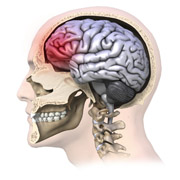Research and Innovation, UNL Office of

Center for Brain, Biology, and Behavior: Faculty Publications
Document Type
Article
Date of this Version
11-22-2016
Citation
Brenna C McDonald, Laura A Flashman, David B Arciniegas, Robert J Ferguson, Li Xing, Jaroslaw Harezlak, Gwen C Sprehn, Flora M Hammond, Arthur C Maerlender, Carrie L Kruck, Karen L Gillock, Kim Frey, Rachel N Wall, Andrew J Saykin, Thomas W McAllister, Methylphenidate and Memory and Attention Adaptation Training for Persistent Cognitive Symptoms after Traumatic Brain Injury: A Randomized, Placebo-Controlled Trial, Neuropsychopharmacology accepted article preview 22 November 2016; doi: 10.1038/npp.2016.261.
Abstract
The purpose of this multicenter, prospective, randomized, placebo-controlled study was to evaluate and compare the efficacy of two cognitive rehabilitation interventions (Memory and Attention Adaptation Training (MAAT) and Attention Builders Training (ABT)), with and without pharmacologic enhancement (i.e., with methylphenidate (MPH) or placebo), for treating persistent cognitive problems after traumatic brain injury (TBI). Adults with a history of TBI at least four months prior to study enrollment with either objective cognitive deficits or subjective cognitive complaints were randomized to receive MPH or placebo and MAAT or ABT, yielding four treatment combinations: MAAT/MPH (N=17), ABT/MPH (N=19), MAAT/placebo (N=17), and ABT/placebo (N=18). Assessments were conducted pre-treatment (baseline) and after six weeks of treatment (post-treatment). Outcome measures included scores on neuropsychological measures and subjective rating scales. Statistical analyses used linear regression models to predict post-treatment scores for each outcome variable by treatment type, adjusting for relevant covariates. Statistically significant (p<0.05) treatment-related improvements in cognitive functioning were found for word list learning (MAAT/placebo>ABT/placebo), nonverbal learning (MAAT/MPH>MAAT/placebo and MAAT/MPH>ABT/MPH), and auditory working memory and divided attention (MAAT/MPH>ABT/MPH). These results suggest that combined treatment with metacognitive rehabilitation (MAAT) and pharmacotherapy (MPH) can improve aspects of attention, episodic and working memory, and executive functioning after TBI.
Included in
Behavior and Behavior Mechanisms Commons, Nervous System Commons, Other Analytical, Diagnostic and Therapeutic Techniques and Equipment Commons, Other Neuroscience and Neurobiology Commons, Other Psychiatry and Psychology Commons, Rehabilitation and Therapy Commons, Sports Sciences Commons


Comments
© 2016 Macmillan Publishers Limited. Used by permission.